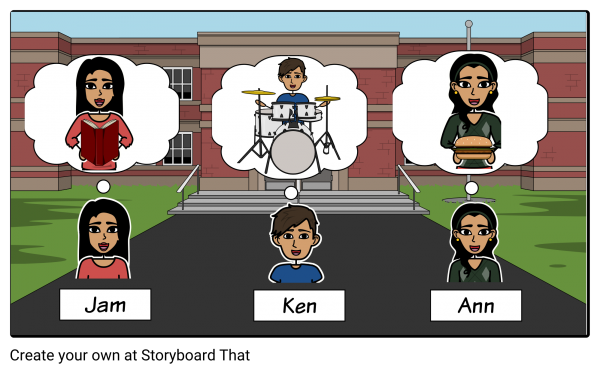Let’s read the dialogue. I will play Sam and you will play Alice. Then, we’ll switch roles.
以下の会話文を読みましょう。最初に講師がSam、あなたがAliceの部分を読みます。終わったら交代しましょう。
 My week is so busy. Our class has been practicing for our show next week. My week is so busy. Our class has been practicing for our show next week. |
What kind of show will your class have next week? |
 We will have a musical show. We will have a musical show.
|
Oh, that’s interesting. May I watch your show? |

Of course. But I must give you a ticket for the show first. |
| How much is it?
|
 It’s free. I can give you the ticket later in the afternoon. It’s free. I can give you the ticket later in the afternoon.
|
| That’s great! Thank you, Sam.
|
Please answer the questions I will ask you about the dialogue.
講師が会話文について質問するので答えてみましょう。
1. What kind of show will Sam’s class have next week?
Answer: _________________________________________________.
2. What must Sam give Alice?
Answer: _________________________________________________.
3. Did Alice ask Sam if she may watch the show?
Answer: _________________________________________________.
4. When can Sam give Alice the ticket for the show?
Answer: _________________________________________________.
Study the picture for 1 minute. Please answer the questions below using “will and can”.
1分間イラストを見ましょう。”will”、”can”を使って質問に答えてください。

1. Who will read a book later?
Answer: __________________________________.
2. Who can play the drums?
Answer: __________________________________.
3. What will Ann eat?
Answer: __________________________________.
Let’s talk. Please answer my questions. You may ask questions, too.
会話練習をしましょう。講師が質問しますので答えてみましょう。また、講師に質問してみましょう。
1. What will you do after our class?
Answer:__________________________________________________.
2. What will you eat for dinner?
Answer:__________________________________________________.
3. Do you have a friend who can play the piano?
Answer: __________________________________________________.
4. Do you think all students must play sports?
Answer: __________________________________________________.
5. What time may the students in your school go home?
Answer: __________________________________________________.
| Grammar 文法 |
Pronunciation 発音 | Vocabulary 単語 |
Comprehension 理解 |
|
|---|---|---|---|---|
 GOOD GOOD |
文法の誤りはほとんどなく、完全な文章で話すことができる | ほとんどの単語をはっきりと正しく発音することができる | 習った表現を適切に使うことができる | 文章を理解し、質問に正しく答えることができる |
 FAIR |
文法の誤りはあるが、完全な文章で話すことができる | 発音の練習が必要な言葉がいくつかある | たまにミスはあるが、習った表現を適切に使うことができる | 文章を完全に理解するのは難しく、質問に正しく答えられないときもある |
 POOR |
文章で話すのは難しく、単語だけで話すことができる | 発音の練習が必要である | 習った単語と表現を少しだけ使うことができる | 文章を理解するのは難しく、質問に答えるのは難しい |
レッスン教材の改善・拡充を図ることを目的とし、アンケートを実施しております。
以下のURLからアンケートにお答えいただき、 ご意見・ご要望をお聞かせください。
アンケートはこちら